#something something brothers grimm.
Explore tagged Tumblr posts
Text
This is the first thing Salem learns, after the brothers leave Arziant in flames behind them: that the creatures of grimm know kindness.
Everything turns to fire.
Even the air itself screams with a heat so intense that her skin cannot regrow before it starts to melt and blister again. Salem burns alive and burns alive and burns alive and—
When she wakes from mindless agony, she finds herself in the sweltering warmth of a deep cave and bathed in the stagnant-water stench of grimm. These creatures she was taught to hate and fear as abominations pace in silent circles all around her, everything limned with the sunset glare of their fiery eyes, their pitch-black flanks singed and smoking. They do not in any way acknowledge her presence; but they brought her here with them, to shelter from the inferno outside, and she will never be able to look at a grimm and think monster again.
Time slips so easily away from her. Days, weeks. Months. Eight thousand nine hundred twelve: the number branded into her soul by hunger. Eighty-nine hundred and twelve times she starves to death before she loses track.
That hollow feeling. The ache, before light rakes her apart and sutures her back together and she rises again, unsteady. Searing pain clarifies itself; the hateful golden furnace of infinite life burns crimson through the brittle membrane of her skin. Eight thousand—
It doesn’t matter.
The plangent echo of her pulse fills the deathless silence at the end of the world: a catathymic note throbbing in the nexus of planetary song; that awful cosmic heartbeat, in the tearing aftershock of violent divinity. Sometimes the deteriorating scrim of human delusion peels away and she falls into hematic convulsions as the world turns inside her chest, pulverizing meat and bone to gory pulp while she writhes in transcendent agony. Creation—an inchoate redness—life. Everything begins in pain. The first taste is always blood.
She understands—
After fire comes darkness, and then even the grimm begin to waste away: unspooling their flesh in long ropes of slime as what little survived the cauterizing of the shattered moon withers under the scorched-black sky. Salem flays herself to feed them, for all the good it will do. Starvation still dissolves them one by one.
She just wants to save something. Wants to give life instead of death, for once; and the grimm were kind to her, in their way.
Hunger makes them brutal. The last grimm in the world tears her apart, and it hurts, and…
…and she is on her knees in a wide but shallow river of water clear as glass. Mist treads softly through the quiet darkness, and the air tastes fresh and sweet.
Salem stays where she is for a while, eyes half-closed, basking in the soothing peace of a rare pleasant dream—but nothing remains still in the river for long, and it dawns on her gradually that she is not alone. Kneeling beside her, resting a hand between her shoulders, is a giant woman of wicker and painted clay.
She asks: “What are you? Who are you?”
The woman answers: “I am the germinating seed and the mouth that opens. I am the circle drawn by itself. I am the Artisan.”
“…Is this real?”
“It is real to you.” The Artisan’s thumb caresses her back, and Salem curls in on herself, ragged and tearing at the seams before the vicious claws of even that small tenderness; at her choked cry, the hand lifts away, leaving her huddled in miserable anguish. “You can leave this behind,” the Artisan says, “if you would like.”
“Leave–?”
“It is the nature of things to change. Living things grow.”
“I don’t,” Salem rasps, “understand.”
“You cannot die,” says the Artisan, and she flinches, “but you can change. Leave behind the burden of what you are now to become something new. If you let the river wash you away, who could you be?”
The water flows over her hands, pure and cold. Her eyes sting with unshed tears. She whispers, for the first time since before the end of the world daring to hope, “Could I find Ozma? Is this—what happens when people die?”
“You are the first of your kind to come here,” the Artisan tells her gently. “The one you love is in the place the Brothers made for their creations.”
It feels like her heart breaking all over again, and her fingers curl and become clawed. “Are th– are they happy?” she breathes.
Maybe it can be okay, as long as she knows they’re safe and well wherever they are—maybe. Maybe.
“They are at rest,” says the Artisan. “Preserved, feeling and knowing nothing.”
“Forever?”
“Yes.”
“But—” A nameless horror overwhelms the words. Her mind conjures up an image of Ozma on their deathbed, insensate; the notion that that is their eternal fate—the fate of everyone who ever lived—to lie in feverish oblivion until the end of all things, is unbearable. It is not to be borne. “No.”
“It is the truth,” the Artisan says.
Salem throws herself onto her feet as a keener fire than the embers of hope kindles in her soul: she names it wrath, and cradles it against her heart. “I will not leave them behind,” she seethes. Just as they pulled her from her tower, she will find a way to win them free from theirs; free everyone slaughtered in her name. “I—”
How? How, when the world lies dead and broken and even the grimm cannot survive? Salem squeezes her eyes shut, trembling. Afraid.
She has never felt so small.
“What is this place?” she asks, plaintive. “Where did you come from?”
“This is the place that is,” says the Artisan. “It is the drawing together and drawing asunder that is maker and made of all things. It is the transformations of fire. I am the shaping hands of what was ever before and will be ever after.”
“…of fire,” Salem echoes, turning away. The river flows and flows forever in silence. She can feel the Artisan watching her.
Of fire.
She takes a breath. “Your face is fired clay. Will you allow me use of your kiln?”
———
There is a fire. Salem builds a forge, digging slabs of clay out of the riverbank with her bare hands in this strange, protracted dream. Sometimes the Artisan sits at their workbench and talks to her while they sculpt, and sometimes there is a thing with feathers that perches above the kiln to give voice to a hollow, keening cry. Mostly, she is alone.
Infinite life hurts so much. Not a single part of her can die; immortality riddles her with cancerous, painful light. The God of Light did not understand what he asked for when he bade her to heed the importance of life and death: and perhaps that is why his brother had grinned.
Destruction, to clear the wilderness away.
She claws her belly open and pulls out the vermillion meat of herself in fistfuls, gasping but undeterred by the pain. The wounds seal over and blood congeals on her skin while she feeds herself to the ever-living fire, and as the forge feasts her flesh and blood melt together into iron. It takes time—it takes trial and error and more tries than she could count—but Salem forges herself a sword.
The blade blazes like the sun when she holds it. It sings of pain and desolation: it doesn’t know how to be anything else but what it is. But it makes the light hurt less.
“Can I come back?” she asks,
and the Artisan says, “You will find the door again when you need it.”
When she returns to Arziant, the world is still dark and terribly cold. Nothing lives—not even the grimm, whom she mourns almost as deeply as she mourns her own kind.
Her sword sunders the darkness, burns the poison out of the sleet, thaws the sheets of ice. She wanders: a solitary vagrant so delirious with hunger that she takes to gnawing her own arms until her teeth hit bone. The sky turns blue again. Sunshine bathes a landscape of churned mud and barren rock. For—years, decades, centuries—for an age, she combs the planet, searching for even the smallest sign of life.
There has to be something.
Finally—finally—she finds a newborn colony of fungus poking through the muck, spongy and soft, finger-shaped, dull yellow and rancid on her tongue. She digs a second one up, careful to disturb the rest as little as possible, and returns to the place that is.
In her absence, the Artisan has begun to work the forge, but when Salem asks for use of it again they press the hammer into her hand with a patient smile. The idea in her mind is clearer than before, and she has a better sense of how. When she casts the little fungus into the flame it bursts and turns to gold; she alloys it with her memories of sunlight, of wheat fields, of oceans and blue skies.
This time, she makes a staff. Its haft radiates the warmth of summer, and the crystal setting at the head glows with the pure, rarefied blue of mountains on the horizon.
(It reminds her too much of Ozma; it aches.)
When she clambers back into the carcass of Arziant with the staff in her hands, the whole world seems to shiver. The little fungi have swelled and flourished into vast, peculiar forests; and there are other kinds now, as life heaves itself bodily from the mire. Wherever she goes, carrying the staff as a walking stick, new things begin to grow. (Most of them foul: it comes as a surprise the first time she tastes something and finds it sweet.)
Notions of self bleed away. Past and future slough away too, neither cognizant of the present; there is only and always the work. Existence, in a trancelike artistic fugue. Sometimes the sword, sometimes the staff. Death and life. Life and death. There is a rhythm to it. A kind of song. The planet flexes its claws and remembers how to breathe; the wilderness dances, ever-shifting, a symphony.
(Later—much later—she will turn these memories over in her hands like fragments of a dream. Some of it, she’s certain, was real; and equally certain that some of it wasn’t. Reason dictates that she was alone, but she won’t remember solitude.)
The world begins to look familiar again. It is the sound of birdsong that draws her out of waking dreams to the hush of surf on a rocky beach and the feeling of cold, clean rain on her face. She falls to her knees and weeps for missing Ozma, grief splitting her open as if she had lost them only yesterday, because the world is beautiful again and she wants so desperately to share it with them.
So Remnant is born from the grave of what was, and brings Salem back to life with it. She is not its creator, not its maker—she does not feel like any kind of god—but it is born by her hand. If pressed, if coaxed, she might offer instead the suggestion of midwifery.
She does not go hungry anymore. She eats seaweed and crabs and oysters until she collects a handful of pearls, and these she fills with moonlight before she returns, once more, to the forge whence the river flows.
The third time Salem asks to use the Artisan’s workshop, she already knows what will become. The pearls gleam like glacial ice when she nestles them in the coals of the ever-living fire. They run together as molten glass, and she fills out their shape with sorrow and joy and anger and love—she loves so, so fiercely, it is all she knows how to do—and sets the shining bauble in gold spun from the names of every person she has ever known.
The lamp gives illumination of a kind the God of Light could never and will never know. It is the heart of Remnant which never forgets. When she journeys up the long dark spiral of the path to her world, she can see the barest shape of something by lamplight, an inkling on the edge of her sight, a whisper.
She brings the lamp to the top of the world, where the air turns thin and the snow never melts and the broken moon hangs almost close enough to touch. (She wants to see. She is trying to see.)
There, she finds a grimm: sleek and pantherine, midnight-black, still soft as newborn clay.
“I’m sorry,” she says. “I wanted so much to save you.”
And, “I hoped this one would bring you back.”
It doesn’t attack. It needn’t starve. The sword and the staff and the lamp can feed it all it needs, and it seldom leaves her side. (Salem likes to pretend it enjoys her company; she can almost imagine that it forgives her.)
There is one more left.
She is not sure how, but eagerness gnaws in her with a relentless, esurient pain. She wants—and the grimm wants—
“You should have a name,” she tells him one day. “Do you want a name? I think Firwitt would suit you well.”
He collects feathers for her to try, but it needs to be right—it needs to be perfect.
In the end, she gets what she needs by happenstance. A storm, like so many others. Lightning lances the air and splatters the sand on the beach like so much glass, and Salem catches a molten droplet in her hand and thinks: yes. This will do.
Feathers of ravens and hawks and sparrows in one hand, liquid glass in the other, she dives into the place that is to ask, for the fourth time, for the last time, to use the forge.
“What will you make?” the Artisan asks,
and Salem says, “A crown, this time. For what might be.”
The lightning-struck glass and the feathers turn first to blood and then to rubies when she offers them to the primordial flame. For the rest, as with the sword, she gives of herself: a braid of her hair, a breath from her lungs, a drop of blood, a long strip of flesh, soldered together with all the words she cannot say.
The crown is beautiful and it is cruel, in the way that only hope can be, silver as moonlight and burning with the fires of dusk. It is defiance and spite and willpower and it will, she hopes, be freedom too.
(It is not.)
When she ascends to Remnant once more, Salem kneels in the meadow that reminds her most of them and dons the crown. With Firwitt curled around her and the sun and moon and all the stars wheeling overhead, she tries—she casts herself far and wide, she rakes the talons of her will over the chains and rattles the bars of the cage and burns and howls and goes blind before the fierce white light and still the gates of death will not open; until at last hunger whittles her down again and she falls out of the dream to wail, face pressed into the inky flank of the only grimm in the world.
Aura seeps into the ruined sockets of her eyes, sluggish, foaming over scorched retinas in jittery sprays of crimson etched with gold. It is hours before she can open them and see anything through the scintillant haze besides a grainy impression of blue.
Despair wells up in her chest.
“I don’t know—” she begins desolately, and then stops:
Because she does know.
The place where the font of creation had been is not difficult to find, though the land has torn and shifted long since. It has remained stubbornly bare and lifeless through all her efforts: a vitrified expanse of rock which had, eons ago, been wrung dry of the water that now flows in her soul. Her footsteps make no sound against the glassy rock as she climbs to the apex, sword in hand.
She whispers: “Destruction,” and plunges the sword into the stone.
The ground heaves; the glass shatters; the lifeless blister craters at long last, and Salem goes down with it. The liquid rushing up from beneath is not alive, but when the rocks crush her the sterile water mingles with her blood, and when it rushes down her throat it remembers how to breathe, and the possibility of life ripples out and out until it laps against the distant, sandy shores of a new sea.
She leaves the sword buried in its basin, and retreats into dreams while the currents drag her ever so slowly back to land.
It is weeks before she finishes choking up saltwater.
Next, she travels east, traversing the vast ocean to the desert at the opposite end of the world. In the desolate, burning center of those windswept sands, she plants the staff and murmurs: “Creation.”
The dune ripples and becomes water, becomes soil, becomes lush vegetation as a great tree with silver flesh and golden leaves surges out of the desert to engulf the staff. Salem rests for a long while in that luxuriant oasis, basking in warmth and living on fruits that exist nowhere else in the world, giving names to the things that come to eat and drink and doze in the shade, until she is ready to move on.
North, then: to the highest peak at the top of the world, where the sun never sets in the summertime but the darkness of the winter lasts for months. She sculpts a lighthouse from the ice at the summit, and nestles the lamp inside. She says, “Knowledge,” and the winter night fills with a ghostly memory of sunlight, a promise that the sun will find its way home and daybreak will come again.
And, finally, she sails south to a place where the ocean swirls and churns in a great whirlpool, the basin miles below straining to hold back the inchoate rage of darkness below. She hurls the crown to the maelstrom, and when the water takes it she breathes, “Choice.”
And the land screams upward to meet it in the most violent eruption the world has ever and will ever know. It forms a jagged scar of barren rock and mud and molten tar, but it will grow into life when it is ready, and the crown will roam in the rivers far beneath the waves.
Finally, having given of herself and feeling dizzily light for the absence of their weight, Salem washes back ashore, and holds Firwitt’s face between her hands, and asks him, “Where did you come from?”
(“Fate,” the spirit chained to knowledge will one day say, “led her back to the land of darkness;” but that is only half true.)
She is afraid, a little. She does not want to die. Even more than that, she fears she will be wrong. When she approaches the black dome of the night’s domain, the jagged rocks unfold for her like a great maw, and she stands quivering on the shore of a boiling lake of atrum that has not changed. Unthinking, she reaches out to Firwitt for comfort, for reassurance—for nothing, because he is not there.
(He never has been. The realization is abrupt and thorny. In a way, it makes it easier to clamber into the largest outcropping.)
The sun burns overhead. Salem kneels above the pool of grimm, feeling the heat of it on her face, the foul vapor, and bows her head in prayer to any god who cares to listen that this will be the answer: to Darkness, to the fire, to the Artisan, to the Singer, to the sun and the moon and to all the stars, perhaps even to herself. If this is not it she does not know what she will do or what she will become. So she prays, shaking, wetting the rock with her tears until the moon claims the sky.
Then she closes her eyes, and lets herself fall.
She expects it to burn: it does not. She expects to be flayed apart: but the atrum is gentle, and the grimm simply fold around her and bear her down and down to the heart of the world, where the pressure is infinite and the blackness radiant.
There, slowly, grows the sense that she is lying in the coils of some vast serpent; that its head rests on her back, scales sharp as knives but caressing her skin too delicately to do her harm, its breath a reverberation of her own.
“What are you?” she asks.
I am the roots, it says. The Walker in the deep.
“Am I going to die?”
It is strangely meditative. Her eyes remain closed. She curls her hands against the scales, the bark, half-sleeping. The Walker says, there is no death here. Only stillness, and motion. Stay, and we will become one, you and I; I dissolving into you and you settling into me; to cease, and be renewed.
“That is a semantic distinction.”
…Perhaps. Or, if you prefer, ascend: and go away changed into yourself.
“I wanted to bring people back,” she whimpers. “I wanted—”
You have, says the Walker. That world is not of the Brothers now; it is of you. Time stands still here, in the roots, but it runs in circles above and your kind pour forth from the sundered gates. Dear child, you have not failed.
She sobs: with relief, with old anguish, with new hope. “Then I want to live. Please.”
If you return, the Walker says, no less gently than before, you will bring the darkness back with you.
“Grimm?”
As you call them, yes.
She feels a half-hearted flicker of hesitation. Of something too base to call nobility: she wonders what Ozma would think. But she wants to live. She wants so very much to live.
And the grimm saved her once, and she had wanted to save them in return.
“I want to live,” she whispers.
Then rise, answers the Walker. Become what you will and be free.
#AND TIME DOES THIS TO US ( fic. )#MAIDENS AND KINGDOMS ( hc. )#THIS DARK THING THAT SLEEPS IN ME ( hc: salem. )#[ shaking heraclitus between my teeth like a terrier with a rat.#NO you DON’T understand they wrote volume nine FOR ME. FOR ME! ]#[ the god of light checking in to see if salem is ready to plead for mercy yet: hey what the fuck#that’s not allowed#gimme those.#and then he chains his brothers ascended selves inside#something something brothers grimm.#something something the golden cap.#file under: salem isn’t the witch of the west she’s glinda. ]#[ oh uh#gore cw#on this one. ]
22 notes
·
View notes
Text
ITS THEM
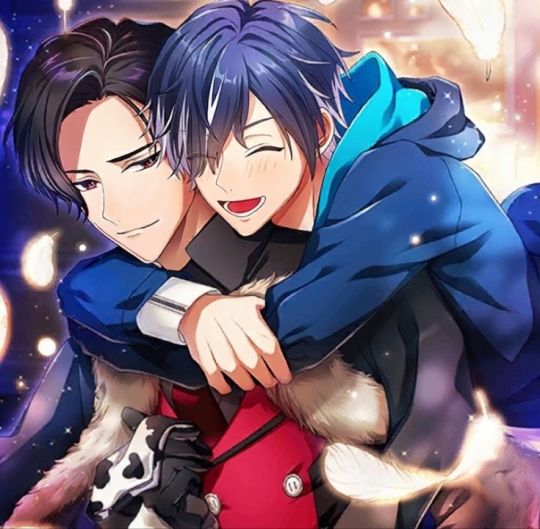
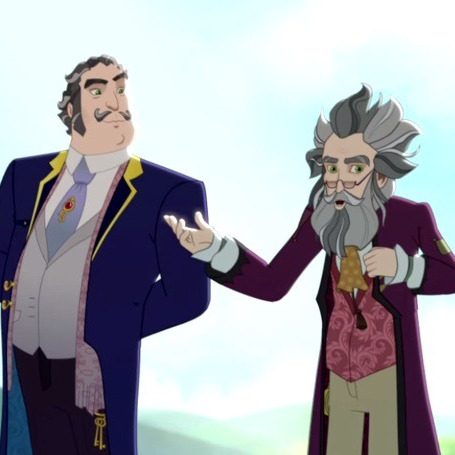
#im rewatching eah to feel something and this realization hit me like a truck#for those of you who don't know ever after high (peak fiction)#the older brother (left) milton grimm sealed his brother giles underneath the school#because he thought giles' (good) actions would cause chaos#lucifer and belphie are like their lame budget versions /affectionate#from me#obey me#other#1#7
113 notes
·
View notes
Photo


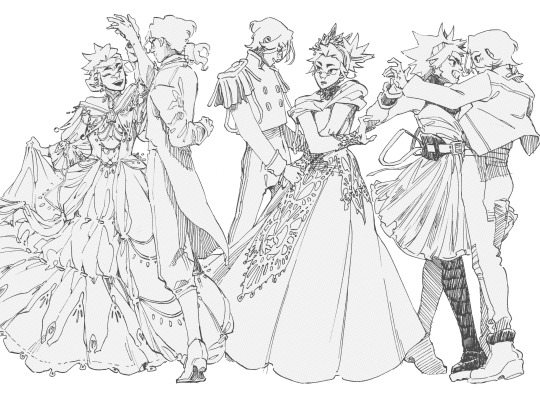

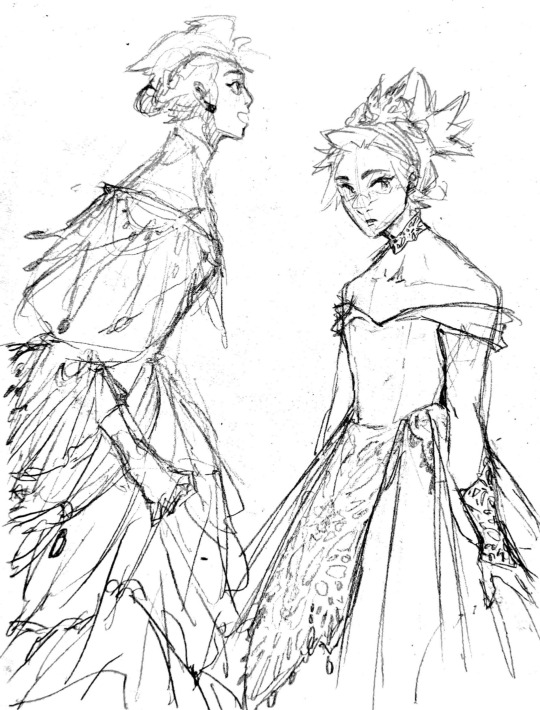
more sk8. I think the cindereki stuff is extremely stupid but I am not immune to trying to conceptualize a princess gown in any setting
#sk8 the infinity#kyan reki#hasegawa langa#renga#if ur wondering yes the first gown I uh. pulled? from the brothers grimm version's idea#which I do prefer to the perrault/disney version. specifically bc there's no fairy#there are three balls happening on three consecutive nights and each night cinderella gets a gown and accessories from a tree#growing on her mom's grave#(the version I grew up with (translated to vietnamese) actually wrote it to be her dad's grave instead I literally dont know why)#and the wording is like. ''rain gold and silver on me'' or something like that? which is why all of the dangly bits in that design#(dont worry about the rest of the brothers grimms version. thats not important. dont think about it its not in the room with us)#also in this post: future!renga bc of fucking course. who do you think I am. who do you think I am#I see a character I love I immediately try to imagine a good future for them it is Simply my ways#ft. the lethal combo of being three kinds of queer + adhd + a teen#may just be bc I myself don't go to college lol. but I can't really imagine reki going to college. he'd get apprenticeship somewhere#like immediately. on sight. some uncle in nago would snatch him up a sentence in#I waffle on langa but him just getting out of the biggest shock of his life + severe depression would Not let go of his loved ones#so tbh I can't imagine him leaving okinawa either. at least right after high school#langa has the advantage of not giving a single shit about ''his potentials'' so he'll be chasing life's pleasures for a hot second thank you#also I believe in reki speaking at least passable conversational english thank you. he's trans and gay in asia#he's just also the kind of guy who has to think for a hot second to remember which way the written number 3 faces#''nailed the logic just plugged the wrong number in several times'' kind of guy#while langa's the ''doesn't understand the fundamental concept of puzzles'' kind of guy#man. this is like having two homunculi implanted in my brain. welcome boys come join leon pokemon#talk to each others while I do my job ok? thank you#that said. the comm queue should be finished up soon#(funny thing to say about three comms I know. but I will say it anyway)#and I'll take a few days break to unclench my brain and then get back into it#every day I learn new things about the dip pen. its great#okay. nap now tho. anything else can wait
130 notes
·
View notes
Text
Reading a bunch of Hans Christian Andersen stories for my fic and it’s like buddy your ideas are incredible but the execution is so lacking sorry. Someone needed to break this guy out of his Christian guilt complex so he could write about other stuff too
#like not that something like brothers Grimm isn’t super overtly religious#I mean hell the devil shows up a lot#but it’s like hans. buddy. we get it#good girls go to heaven okeeeee then#bad girls get chased around by their own severed feet#actually that’s very funny this is a dichotomy I can get behind#lea talks
9 notes
·
View notes
Text
v intrigued by the 4th one so far. i love how its, once again, a completely different setting and time period than all the others
#grimm liveblog#tedpost#tedtalks#also i figured all of these had different directors but. ill have to check. i dont think they do but it feels like they do.#also. i think these variations are supposed to be like. versions of their stories that their sister made. or something like that.#since shes present in all of them as (semi) important charas#whereas her brother are always some of the bg charas
6 notes
·
View notes
Text
i wanna write a fairytale pastiche, can you guys send me your favorite fairy tales (preferably in the form of links to online hosted pages) so i can steal the style
#red rambles#its been juuuuust long enough that all the things i can think of are like. translations of old as balls poems really#and like Beowulf 2 and Poetic Edda Castoff are both not really what im going for here#i can obviously read the obvious ones - everyone knows brothers grimm - but i want to read things that are fun and fresh for me too#you know how it is. you understand#bonus points for stories that arent particularly popular in t#the usa but are super well known in other parts of the world#i read a loooottttt of fairy tales as a kid and whil e im always happy for a refresher on something i barely remember i want Real New more
2 notes
·
View notes
Text
No one come at me BUT doesn’t Ruby and Yang parallel the brothers Grimm in a way?
Like, so, we have the older sibling, the golden one. Which one am I on about? Yang or the god of light?
Then we have the younger sibling, the darker one. Which one am I on about? Ruby or the god of darkness?
Then there’s the other part of it, right, the silver eyed sibling and the purple eyed sibling. Which one am I on about now? The gods or our dear RWBY sisters?
Just a thought. No hate please.
#rwby#Ruby rose#yang xiao long#rwby theory#the brothers grimm#god of light#god of darkness#it’s just something that I thought was oddly similar#it’s probably nothing intentional#but I HOPE it’s endgame that the girls and gods sit down#and notice this similarity because MAYBE#they’ll relate to eachother#and Yaknow not end the world or whatever when judgement day happens
9 notes
·
View notes
Text

we don’t need to talk about the dog lol
#there’s a brothers grimm story called sparrow and the dog#about a sparrow and a dog caring for eachother#and then one day the dog gets run over by a trader and dies#and the sparrow goes on a rampage abd ruins the traders life before killing him#which is very sparrowcore <33#but yes sparrow#also general sparrow headcanons that went into my design#i def think they’re mixed#rroma is what i personally like for them but like#it’s not definite so they could be something else#but as someone whos mixed seeing sparrow get darker when they’re outside a lot and lighter if they’re mainly fast traveling and inside#that’s literally me bro#i get so dark during the summer and then in the winter i’m like a different person#so mixed/multiracial sparrow#also a lot of the femme sparrow concept art has her wearing hoops#i think cause they were toying with giving her a rroma identity#but i love hoops personally i wear them a lot#and i also wish sparrow could wear jewelry in general#general explorer fit lol#anyways i love her <3#fable 2#fable#fable 3#fable iv#fable ii#fable iii#fable sparrow#fable ii sparrow
6 notes
·
View notes
Text

I get it but it is in fact germany in general thats fucked up
I enjoy a joke about fucked up German fairy tales as much as the next nerd, but it's genuinely striking how often the source for the really fucked up stuff turns out to be "yeah, this is only in the Brothers Grimm version and doesn't appear in any extant oral tradition, and we're like 80% sure they added it themselves". To a large extent it's not German fairy tales that are fucked up, it's two specific German dudes.
29K notes
·
View notes
Text
The child’s time with Rumpelstiltskin had left her different. There was no one to recognize this, of course, because the child they had lost was merely a baby, and the child that had been returned to them appeared as the same. There was nobody to acknowledge the change that had been done. Not even Rumpelstiltskin himself would have been able to register the effects of his actions, because he’d never met the child before him, and he’d long meet the child after. None of this changes the fact that the child left his home Different.
Had she never stayed in his home, she may have had the opportunity to be seen as normal. Likely, she would have been able to be a child. She could have played with dolls, gone to school, trained for the future she was expected to fulfill. This is, in fact, what her parents expected of her. A childhood, an adolescence, then an adulthood. They expected not to be present for anything past that. Their expectations would have been correct, had they not lost her. The child they got back would never be able to do those things. Her experience had exposed her to a magic they would neither be able to see nor imagine. The child they got back was stuck in a sort of limbo, of which she would not likely escape.
After her time in Rumpelstiltskin’s home had left her an impossibility: a fey child in the body and home of a human one. Nothing would fix her. Plenty could, but nothing would. Fate opposed her happiness. She was not the only one.
#writing#lore#rumpelstiltskin#fairy tales#grimm brothers#dnd#straight from my old campaign’s lore#part one#?#trying to decide if I’m interested enough in my own writing to justify writing any more#there’s definitely a lot more where this came from though#if anyone’s reading this#say hi or something#im bored#always appreciate notifs#although don’t go looking for more of this yet#I don’t have the motivation for more yet#and there definitely wasn’t anything before this#idk if anyone wants to read my random dnd- or un- related stories lmk#got a little carried away#with the tags here#woops
0 notes
Text
No one gets me like the Brothers Grimm...
#just read the original preface of grimms' fairy tales and it almost made me cry#totally normal right#''fairy tales tell us about a better world#because the evil in them is a big and terrifying monster instead of something close to us that we get used to#and because it will always be defeated in the end''#(very rough translation)#they get me!!!#they get what stories are about#they get what a perfect world would be like#have i mentioned that i'm totally normal#fairy tales#fantasy#brothers grimm#yelling at empty skies
0 notes
Photo
ehhh this story is suited for this time, this place, and the little girls that occupy it. the original cinderella folktale was intended for women of a different time and place. it’s not a bad story because it’s not applicable to us in the same way anymore



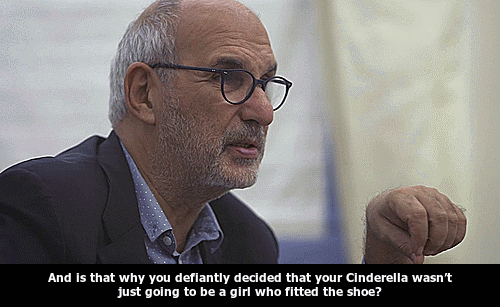

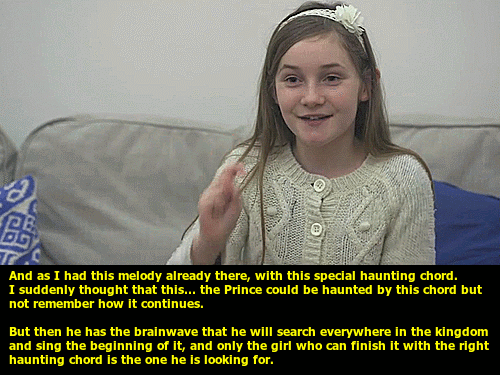

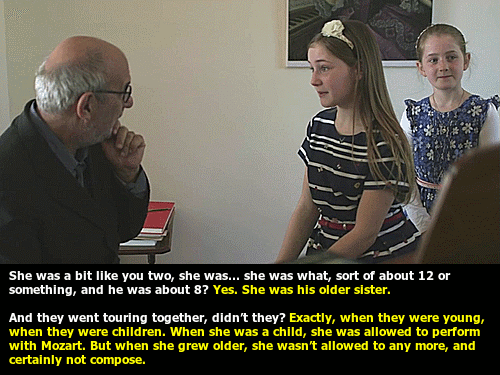
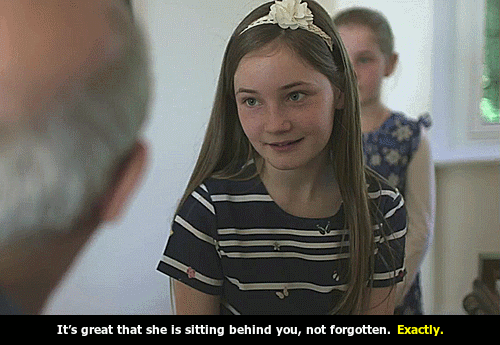

imagine… Alma Deutscher: Finding Cinderella
Musical prodigy Alma Deutscher aged 11 (seen here with younger sister Helen), is staging her first full-length opera, Cinderella.
Composer, pianist, violinist… Alma learned to read music before she could read words. She began playing the piano aged two and at four years old she was composing her own music.
#lvl 1: brothers grimm messing w it lvl 2: disney corporate messing w it#story about escape and healing and growing something beautiful for yourself in the face of mistreatment#is and was a good story
117K notes
·
View notes
Text
Do you ever wonder if the Devildom has silly celebrity TV competitions like The Masked Singer?
A bright green peacock costume graced the TV's screen. The costumed celebrity gripped a microphone and swayed as he sang, commanding all attention from the audience.
"This guy's got a great set of pipes." Mammon was on the edge of his seat humming along to the classic tune. "Twenty grimm says he wins the whole season. And another twenty grimm says that it's Chort."
Satan raised an eyebrow. "I don't think that's Chort. Could he even sing? Plus, didn't he disappear because of his massive debts?"
Belphegor nodded. "I heard he's been trying to dig a river for the last six hundred years. The show's hints made this guy seem pretty great. I think it's Vapula.
"You think?" Satan rested his head on his hand and listened. "He's really good."
Hundreds of long feathers splayed out gracefully from the back of the perforner's costume, as if hypnotizing the viewers.
"I'm tellin' ya, it's Chort. He's probably on here to sweep the competition and pay off his debts. Not a bad plan." A scheme began to take shape in Mammon's brain. "If I call these production guys, they'll be beggin' to have someone like me on next season."
Asmodeus laughed, "you? Maybe in a few seasons after me. I know they're waiting to bring me on as a special guest."
"Wait, really?" Leviathan was only watching in case somebody sang an anime or game cover. Most of the time, he was boredly scrolling his phone and making technical remarks about the costumes. "C-can you take song requests?"
"It's not official yet " Asmodeus clarified, "but I know they'll want me on the show in due time. I'm just worried the mask will hide my true beauty."
The singer finished his performance with a dab and a bow. After racous applause began an excessively long commercial break. Interest in the room dwindled. Nobody cared much about curse insurance.
You hugged a cushion to your chest. Being unfamiliar with Devildom celebrities meant you couldn't play along, but listening to everyone's guesses was still enjoyable.
"That guy reminds me of Lucifer."
Belphegor and Satan made faces like they had just swallowed a frog. There was a beat of silence, then everyone in the room collectively went, "Nah."
"Where is he, anyway?" you asked.
"He said something about a favor for Lord Diavolo," Beelzebub replied through a fistful of buttered popcorn. "Won't be back until late."
"Ah."
When commercials ended, the show began to wrap up. The peacock costume reappeared as the judges tried their hardest to guess his identity. Despite its flat plastic eyes, the costume had a majestic air to it. The masked man still drew eyes even when standing still.
"Last chance for betting," Mammon said. He shook his coin purse. Nobody took up his offer.
With plenty of suspense, the emcee began to remove the contestant's mask. There was a solid minute of the camera panning between the stage, the audience, and the judges.
"Hurry up already." Belphegor tossed a piece of popcorn at the TV.
"I can't believe this!" the emcee shouted.
Asmodeus impatiently squeezed his hands together. "Well? Who is it!?"
"It's...!"
Confetti cannons and bright lights obscured the mystery man's face, yet the audience was going wild.
"I can't believe it!" The emcee screamed.
"If they cut to commercials again, I'm leaving," Satan sighed.
Thankfully, there were no more commercials. There were no more pans to the audience or the judges. There was only one person in the camera's focus.
"Your ruler of hell, the Avatar of Pride himself, the great Morning Star! It's... Lucifer!"
There was a sudden chorus of exclamations. "What!?"
Aside from the television, the House of Lamentation became dead silent. Beelzebub stopped, slowly lowering his hand of food while transfixed on the screen. Asmodeus looked like he was about to cry, having his position on the show stolen first by Lucifer. Mammon looked confused and swiveled his head around, stunned, as though his brothers were pranking him. Belphegor narrowed his eyes with displeasure.
You cautiously eyed Satan, ready to command him to stay if things got out of hand. He just stared at the screen coldly.
Leviathan was first to break the silence. "Wait, really? Lucifer's the peacock?"
"I knew it sounded like Lucifer," you bragged. You raised your arms victoriously. Your cushion flopped onto the floor.
Beelzebub was the only one to commend you. "Good job, I had no idea."
"So it wasn't Chort or Vapula." Belphegor began to drag himself off the couch. "Well, that was unexpected. I'm going to bed."
"What's the prize for this show? How much's he winnin'?" Mammon asked.
"Probably nothing. It's a small appearance fee and the rest is just exposure," Asmodeus explained. Him and Mammon both hung their heads.
Satan got up to grab the remote, mashing the power button until it clicked off. "This show sucks. Let's find something else to watch next week."
#instead of a peacock he'd probably be dressed as a sentient whip#a favor for diavolo indeed (guest judge diavolo)#obey me#obey me!#omswd#obey me shall we date#obey me scenarios#obey me swd#obey me fanfic#obey me brothers#obey me fic#obey me writing#obey me drabble#obey me x reader#obey me x mc#obey me fandom#obey me headcanon
521 notes
·
View notes
Text
The Gang React to You Petting Their Hair
Lucifer
"I am only going to say this once: stop."
You get one warning. One. If you do not cease and desist, he is throwing you out of his study, so help him Diavolo's Dad. No, he does not like it. No, not even a little bit. You really aren't going to stop? You're just a glutton for punishment, aren't you?
....You're very lucky he's too busy to hurl you bodily from this room. He'll just endure it for now.
Mammon
"Hah?! What's the big idea?! This is the revered hair of THE Great Mammon, I'll have you know. So that'll be 100 Grimm a touch, thanks! ....Hey, no, wait, why'd you stop?"
Once he's done turning bright red and clearing his throat, he'll try to capitalize on this whim of yours by offering you a discount on hair touches. A very poorly-planned scheme, because you're not going to pay to do something he'll start begging you to keep up as soon as you stop.
Oh, so Mammon is willing to let you touch his high-value hair for free? You're so honored. What a good boy you are, Mammon. (You can expect a bit more sputtering and some denials that he is anything like a good boy, but bro's into it big time. If he had a tail, it would be wagging.)
Leviathan
*shrieks in confused, touch-starved otaku*
Wait, no, he didn't say to stop! What's with these mixed signals? Petting his hair then stopping just because he shrieks a little bit? Did you want to touch his hair or not? Is it greasy? Oh god, when did he last bathe? ...It was only the other day. You have no reason to be disgusted. You're just a bigoted normie who assumes all otaku are crusty and gross!
Ahhhh?!?!?!?! Again?! Fine! Just don't change your mind again, because that's super confusing! And yeah, obviously he's blushing, you're petting his head and it feels nice and kind of tickles! ....Mm.... You know, once he's settled into it, it's really relaxing, actually...
Fast forward an hour or two and he's probably conked out with his head in your lap, drunk on affection and mostly asleep.
Satan
"What exactly do you think you're doing?"
It feels weird. Why are you doing that? Wait, you're petting him? Like he's....a cat? Hmm. Interesting. He'll allow it. But you should do it properly. None of this mussing his hair around with wild abandon. You have to be gentle and use small movements. Maybe use your knuckles? Gently though. There, that's it.
So this is what it feels like. Admittedly, he probably wouldn't take kindly to this if anybody else was doing it, no matter how well they imitated proper cat-petting technique. But you're a special exception, so in the future, if you feel the need to do this, just let him know. And for the love of all things unholy, don't breathe a word about this to his brothers.
Asmodeus
"Oh, you like my hair? Isn't it soft? I'll show you the conditioner I use."
Asmo loves having his hair played with! Or brushed, or combed, or tugged (just not too hard, please!) His hair is silky smooth thanks to a mixture of his natural good looks and his shampoo/conditioner combination. He'll let you borrow them if you're interested. Your hair will look amazing! And it'll feel even better!
This is cozy. He'll just settle in and let you do this as long as you want. Careful you don't get too handsy; he knows how irresistible he is.
...Well, maybe if you're a little handsy he'll let it slide, but just because it's you.
Beelzebub
"Are you....petting me?"
Kind of weird, but it feels nice, so he isn't complaining. It's a little bit embarrassing, just because it makes him feel a little bit like a puppy, but then again, who doesn't like puppies? He'll be able to continue to go about his day not minding you petting his hair now and again. The only awkward part is how damn tall he is. You might need to keep a step stool handy.
Belphegor
"Nnngh, knock it off...! ... ... ...I changed my mind, do it again."
His initial reaction to being woken up to you stroking his head is annoyance, because dammit, he was sleeping. But once he shakes the cobwebs out of his brain, he'll realize that it actually felt really good and he could absolutely fall asleep under these circumstances.
He'll wait a little while, hoping you'll give it another try of your own accord, but if you don't, he'll eventually cave and grumpily ask you to do it again.
Diavolo
"Hahaha... That's enough, now."
He isn't actually a fan. Maybe it's the fact that he's a prince and has been acting as an autocrat more or less for centuries, but being stroked like an adored pet feels really degrading. Of course, he won't hold it against you, but seriously, stop.
Barbatos
"Are you finished playing around quite yet?"
Another one who isn't into this at all. He's more than happy to spend his free time petting you, if that's what you're interested in, but he is a petter, not a pettee. Read into this what you will.
Solomon
"You're so forward!"
Solomon likes it very much. Too much, possibly. Are you flirting with him? There's something incredibly intimate about touching someone's hair, don't you think? No, please, continue.
Simeon
"Um, what are you doing? ...As long as you're enjoying yourself, I guess!"
Simeon is more bewildered by this than most. Like, are you trying to scratch an itch for him? Is this one of those "viral memes" he's heard so much about? Well, it feels nice, and it isn't as if it's hurting anybody. He'll indulge you for now.
A little to your left, please. Ahhhh, that's the spot...
Luke
"Hehe, that tickles... Hey! Is this a Chihuahua joke?!"
It feels kind of nice, but as soon as he takes a second to think about it, he realizes that you're treating him at best like a little kid, and at worst, like a dog, and he isn't having any of that. He'll scold you for treating a Celestial being so casually, remind you that he's actually a lot older than you, technically, so who's the real baby, and secretly pine for more pets for the rest of his life.
#obey me#obey me headcanons#obey me hcs#obey me lucifer#obey me x reader#obey me mammon#obey me leviathan#obey me satan#obey me asmodeus#obey me beel#obey me beelzebub#obey me belphegor#obey me belphie#obey me diavolo#obey me barbatos#obey me solomon#obey me simeon#obey me luke#lucifer#mammon#levi#satan#asmo#beel#belphie#diavolo#barbatos#the gang react#tgr#dthc
2K notes
·
View notes
Note
do you have any tips on how to write for a quiet character living a comfortable life abruptly being forced to adapt to a rowdy and somewhat violent environment?
Writing Ideas: Quiet Characters
common literary & character tropes
Beware the Quiet Ones: When the character who is hardly ever upset about something, suddenly raises their voice, the world turns upside down and seems to come to an end. There is an unleashed raging or cold speech of epic proportions that not even the most demented character in the story would want to sit through. This rage is almost always expressed verbally, though violence can also be included. Another version could be when the heroes' team is in low spirits, and The Quiet One, fed up with all the sulking, throws the table (or something else) to the side and gives a Rousing Speech to their comrades.
Elective Mute: It turns out that a character assumed to be unable to talk actually can speak, they just choose to be silent most of the time.
Emotionless Girl: An enigmatic female character who appears to be entirely emotionless. Whether she actually is emotionless depends on the story and often on her level of characterization.
Heroic Mime: A hero who never speaks.
Silent Scapegoat: Somebody who willingly takes the blame for everyone else's wrongdoings.
Suddenly Speaking: A character who was initially silent eventually reveals that they can speak after all.
The Quiet One: A character who does speak, but not as much as the other characters.
The Stoic: Quiet demeanor tends towards the brusque or outright rudeness, though there are a few polite Stoics. Some stoics may try to give the impression of a lot going on inside, cultivate an air of mystery and confuse other characters with cryptic one-liners. The Stoic sometimes displays emotion when under extreme stress or in other highly emotional situations, but their usual repertoire consists of mild boredom, detached interest, Dull Surprise or dignified disdain. The Stoics in ancient Greece were philosophers who believed that self-control is the highest virtue, and detachment from strong emotions and passion would give them greater insight in their quest for truth. They also thought that emotional reactions to the inevitable were silly; given that We All Die Someday, what is grieving over death but a judgment that the inevitable was somehow wrong? Stoics would later be criticized for fatalism and apathy.
The Voiceless: A character isn't shown speaking, but might still be capable of speech.
Tranquil Fury: This character can range from happy or stoic, but their anger is more quiet (but still dangerous). What defines this trope is the tendency to become deadly serious when it gets deadly serious.
Examples
In the story "The Six Swans", collected by the Grimm Brothers and Hans Christian Andersen among others, a Fallen Princess must make six shirts out of nettles and can't make a sound for seven years or the spell that transformed her six brothers into swans will never be broken. She manages to keep all of these conditions and gets to break the spell. This is an example of the Elective Mute trope.
Peter in Jumanji, who talks to no one but his older sister Judy ever since their parents' death by car accident. Once Alan gets out of the game and finds his parents are also dead, Peter starts talking to him as well.
Charles Wallace was an Elective Mute trope a child in A Wrinkle in Time. By the time of the later books, he has grown out of it.
Irish Mythology: The battle trance Nuada enters before the first battle of Maige Tuired is sometimes described as a battle fury. However, unlike The Riastrad, the famous "Warp Spasm" of the hero Cu Chulainn, Nuada does not become a berserker, but instead becomes exceptionally calm. This is an example of the Tranquil Fury trope.
Older Than Steam. Shakespeare's Henry V has the eponymous character's Tranquil Fury reaction to the tennis balls.
Dead Poets Society: The shy and insecure Todd Anderson spends most of the film struggling to get out two full sentences and is overlooked by the school and his parents. After his best friend kills himself, the school tries to bully him (and the other boys) into pinning the blame on their favorite teacher — and he leads half the class in an outright rebellion against the headmaster.
Don Vito Corleone from The Godfather is famously very soft-spoken, even hoarse, but an extremely menacing screen presence.
In the original novel The Godfather, both Vito and Michael Corleone were noted as young men for being soft-spoken, understated, and reasonable, especially in contrast to many of their Sicilian immigrant and first-generation compatriots. They go on to become in turn the most feared "Family" heads of their generations, while still rarely raising their voices above a normal speaking tone.
Sources: 1 2 3 4 ⚜ More: References ⚜ Writing Resources PDFs
This is already quite a specific character, and it seems you have a rough idea of your storyline. I don't want to intrude too much on your story, so I compiled tropes and examples in literature as well as other media that are somewhat related to what you described, and you could perhaps incorporate these (& edit as needed/desired) to further flesh out your specific character and plot. Consider which direction you want your story to go; what reactions you want your own character to show once they're thrust into that new environment (Will they continue to be quiet? Will they go the other end of the spectrum? Perhaps somewhere in between? Will they succeed in "adapting" in this new environment?). Do go through the sources for more information and examples. Plus these previous posts that may be useful as well:
On Shyness ⚜ On Mutism ⚜ On Introverts
Word Alternatives: Quiet ⚜ Five-Factor Model of Personality
#tropes#writing ideas#writing tips#writeblr#character development#writing reference#writing notes#literature#writers on tumblr#dark academia#spilled ink#writing prompt#creative writing#light academia#writing inspiration#character building#writing resources
305 notes
·
View notes
Text
well THATS going to turn into a multi-episode arc, if not multi-season

#Jack im happy for you but as a folklore scholar w an early +#medieval/north european focus i feel like i get what's happening here a bit too well....#celtic myth#celtic folklore#fairy tales#brothers grimm#Jack#Jack tales#iykyk#ok Jack hands off the Magic Plot-Instigated Fish. leave something for the other folk heroes
1K notes
·
View notes